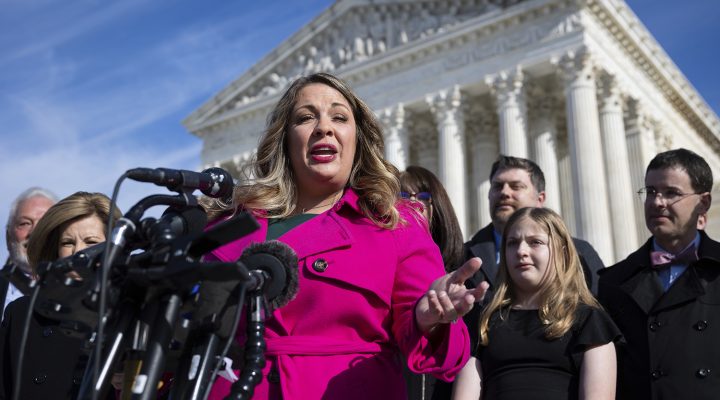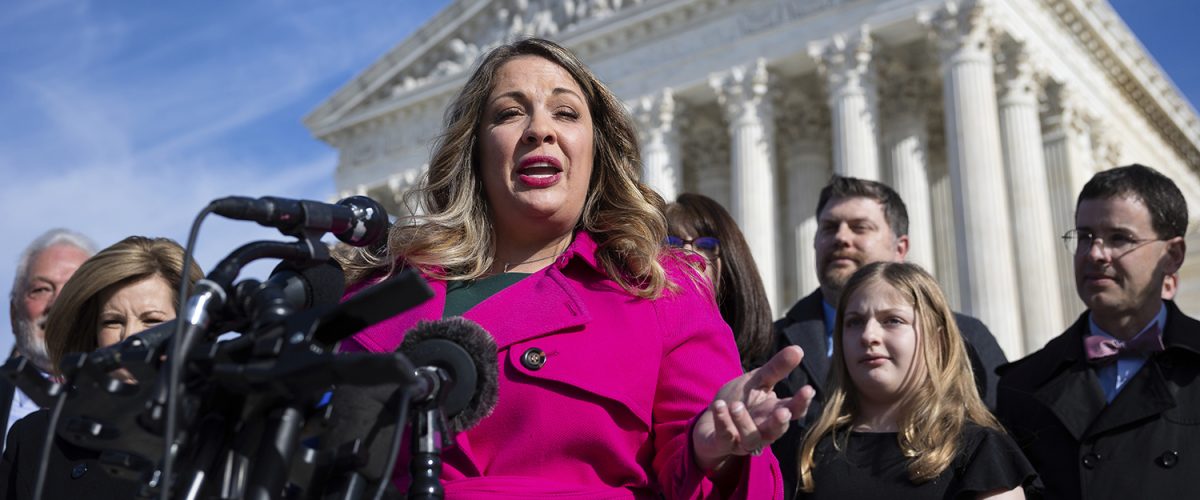The U.S. Supreme Court ruled 6-3 in favor of Lorie Smith, an evangelical graphic artist who says she wants to create wedding websites and is “willing to work with all people” but not same-sex couples.
Her free-speech case was based on the potential of having a same-sex couple as clients, not on any actual request for her services.
“The wedding websites Ms. Smith seeks to create qualify as pure speech protected by the First Amendment under this court’s precedents,” wrote Justice Neil Gorsuch for the majority. “The First Amendment envisions the United States as a rich and complex place where all persons are free to think and speak as they wish, not as the government demands.”
The court’s three liberal justices dissented, saying, “Today the court, for the first time in its history, grants a business open to the public a constitutional right to refuse to serve members of a protected class. … Today is a sad day in American constitutional law and in the lives of LGBT people.”
“Today the court, for the first time in its history, grants a business open to the public a constitutional right to refuse to serve members of a protected class.”
The case, 303 Creative v. Elenis, marks another victory for the Alliance Defending Freedom, the powerful, $102 million Christian legal group founded in 1994 by James Dobson and other conservative Christian leaders. ADF claims to be “the world’s largest legal organization committed to protecting religious freedom, free speech, the sanctity of life, marriage and family, and parental rights.”
Often, “religious liberty” as defined by Dobson and groups like ADF differs from what previous high courts and traditional church-state separationists have believed. The new version of religious liberty emphasizes individual free expression of evangelical Christians more than preventing an establishment of religion. The First Amendment from its inception has been interpreted as a delicate balance between free expression for people of all faiths and no faith against a prohibition on favoring any religion over others.
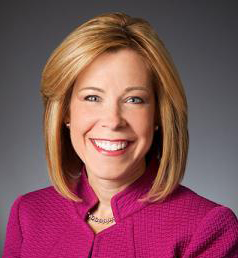
Kristen Waggoner
ADF’s Kristen Waggoner defended Smith, who owns the Denver-based graphic design studio 303 Creative, which creates custom websites. Waggoner and ADF previously defended Jack Phillips of Denver’s Masterpiece Cakeshop before the Supreme Court in a similar 2018 case.
“The U.S. Supreme Court rightly reaffirmed that the government can’t force Americans to say things they don’t believe,” ADF said in a statement. “Disagreement isn’t discrimination. … This is a win for all Americans. … If we desire freedom for ourselves, we must defend it for others.”
Differing responses set up case
Colorado claims its anti-discrimination law targets discrimination in what is sold to whom, not in a speaker’s message. For example, a store may sell only Jewish-themed items, but it can’t refuse to sell those items to Muslims or Christians. Colorado also claims the “sweeping” exemption Smith sought would open the door to racist and sexist discrimination.
An amicus brief from religious groups (Christian, Jewish, Muslim, Sikh) and civil rights groups supported Colorado’s law, arguing, “Anti-discrimination laws have long played a crucial role in protecting the rights of religious minorities. … Amici know from firsthand experience the tremendous success that public accommodation laws have had in ensuring that religious minorities and their adherents can freely practice their faith without the threat of being shut out of the public marketplace for doing so. … This court should avoid creating such a First Amendment ‘right-to-exclude card’ for businesses who want to violate public accommodation laws.”
A number of Christian organizations filed amicus briefs supporting Smith.
A number of Christian organizations filed amicus briefs supporting Smith, including the U.S. Conference of Catholic Bishops, the National Association of Evangelicals, the Council for Christian Colleges and Universities, National Religious Broadcasters, the Assemblies of God, Billy Graham Evangelistic Association, Moody Bible Institute, Tyndale House Publishers, and American Family Association.
Their briefs supported Smith’s right to exercise her “editorial and artistic judgment in a manner consistent with (her) core convictions,” while also claiming creating same-sex wedding websites would force her to:
- “Communicate a message of approval and acceptance of such unions.”
- Succumb to “a culture that increasingly yields to the impulse to dominate political opponents, censor their expression, and even compel them to host speech or engage in speech with which they disagree.”
- Be subject to “the economic, social and political power wielded by the LGBTQ community.”
Reactions to ruling
As with other recent Supreme Court rulings on religious liberty cases, evangelicals praised what others condemned.
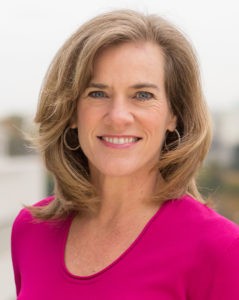
Holly Hollman
“While the prohibition on government-compelled speech is an essential part of the First Amendment’s protections, it should not provide an end run around valid nondiscrimination laws that apply to businesses open to the public,” said BJC General Counsel Holly Hollman.
“Colorado’s statute serves an important public interest in ensuring equal access to the commercial marketplace without regard to race, religion, sex, sexual orientation, national origin and other protected categories. BJC affirms the significance of laws like Colorado’s and rejects any attempt to portray them as an infringement on religious liberty.
“While Americans are free to express their religious and secular views about marriage, including those that conflict with nondiscrimination protections for same-sex marriage, BJC continues to believe that protecting religious freedom does not require granting broad exemptions that would undermine expectations for fair treatment in the commercial marketplace.”
Americans United for Separation of Church and State also denounced the decision, saying: “This court continues to advance the agenda of religious extremists. … Christian nationalists and their judicial allies are trying to drag this country back to the days when marginalized communities were forced to go door to door to find a business that didn’t display signs barring their presence like ‘No Jews, No Blacks, No Irish.’ … Tomorrow, the license to discriminate could extend to other vulnerable communities too.”
The Southern Poverty Law Center also criticized the ruling.
“This misguided decision fails to recognize that personal, including religious, beliefs about LGBTQ people do not form a constitutional basis to discriminate against LGBTQ people in public accommodations,” said attorney Beth Littrell. “Equal access to public goods and services is a cornerstone of civil rights and a free and open society.”
Speech or commerce?
The case arose because Smith said she wanted to expand her design business by creating wedding websites but feared Colorado’s anti-discrimination law would force her to create websites that celebrate same-sex marriages, which are against her beliefs. Colorado’s law requires businesses that serve the public to serve everyone, and two lower courts had ruled against her.
The Smith case is similar to the 2018 case about Jack Phillips’ wedding cakes. Back then, ADF’s Waggoner claimed Phillips’ cakes aren’t products he manufactures but works of art he creates as a “wedding cake artist,” making his cake designs a matter of art and speech, not mere commerce.
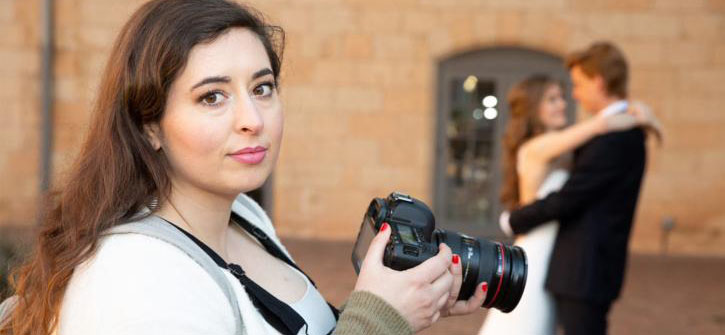
A publicity photo from Chelsey Nelson’s blog.
In another case currently working its way through the court system, ADF is defending Chelsey Nelson, a Christian who owns a photography business. “A Louisville, Ky., law forces a local photographer and blogger to use her artistic talents to promote same-sex wedding ceremonies,” says ADF.
Liberal justices raised questions during a December hearing on the Smith case. Would accommodating Smith open the door to companies refusing to provide wedding websites for interracial couples or for people with disabilities? Could a company that rents chairs decline to rent to same-sex couples?
The ADF’s Waggoner acknowledged the court faces “difficult line-drawing questions” but she drew the solid line at caterers, claiming they aren’t artists, and when they work at weddings, they don’t create art or speech.
In their dissent in 303 Creative v. Elenis, the court’s liberal justices criticized ADF’s arguments about art and speech.
“The business argues, and a majority of the court agrees, that because the business offers services that are customized and expressive, the Free Speech Clause of the First Amendment shields the business from a generally applicable law that prohibits discrimination in the sale of publicly available goods and services. That is wrong. Profoundly wrong,” wrote Justice Sonia Sotomayor.
Case may be based on falsehood
Lorie Smith’s filing documents claim that in 2016 a man named Stewart contacted her saying he was going to marry a man named Mike the next year and wanted to have Smith do design work.
But when a reporter for The New Republic contacted Stewart, the first reporter to do so, she heard a far different story. Stewart, who lives in San Francisco in a heterosexual marriage, claimed Smith has used false information.
“I’m married, I have a child — I’m not really sure where that came from?” he said. “But somebody’s using false information in a Supreme Court filing document.”
Colorado raised questions about the “Stewart” claim in 2019 and said the case should be dismissed. But ADF changed course, dropping the “Stewart” claim and arguing that Smith didn’t need to receive a call from a same-sex customer to pursue her objection to the Colorado’s law.
Evangelical legal groups on a roll
James Dobson helped found ADF to “fight for believers’ rights in precedent-setting cases in the nation’s courtrooms.” Mission accomplished. ADF has won 15 Supreme Court cases that lower the wall of separation between church and state.
303 Creative v. Elenis is one of two cases brought by evangelical Christians decided by the court this week. The court also sided 9-0 with Gerald Groff, a former missionary who got a job as a mail carrier in Lancaster County, Pa., but was disciplined for not working on Sundays. Groff was defended by First Liberty Institute, a $15 million Christian legal group founded in 1997 that claims to be “the largest non-profit legal organization in the nation dedicated exclusively to defending religious liberty for all Americans.”
The cases are part of a growing movement to expand religious freedom through discrimination cases, a trend most Americans reject.
Related articles:
Supreme Court hears case of wedding website designer who won’t serve same-sex couples
High court unanimously seeks a compromise on religious accommodation in the workplace

